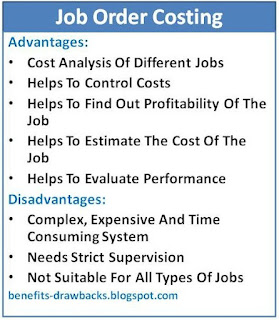Advantages Of Job Order Costing
Main benefits or advantages of job order costing system are as follows:
1. Cost Analysis
Job order costing is a method of determining the expenses before producing a product. It thoroughly analyze materials costs, wages and overheads costs of different departments and production units on the basis of their nature and functions.
2. Cost Control
Job order costing maintains accurate cost record of different departments and units. It helps to compare actual costs with estimated costs and facilitates cost control.
3. Profitability
Job order costing helps to know the profitability of each job separately. It helps the management to identify the most profitable job.
4. Cost Estimation
It helps the management to estimate the cost of similar job by providing past cost details.
5. Proper Evaluation
Job order costing helps to evaluate the performance, efficiency and profitability of different jobs separately which assists the management to identify the most favorable or unfavorable job.
Disadvantages Of Job Order Costing
Main drawbacks or disadvantages of job order costing can be expressed as follows.
1. Complex System
Job order costing consumes more time and procedure to maintain detailed information about the job. It also requires more clerical works to record material costs, labor costs and overheads charges. So, it is a complex method of costing.
Also Read:
Also Read:
2. Expensive System
Job order costing is expensive because of various paper works and procedures for maintaining records of different jobs.
3. Strict Supervision Needed
Strict supervision is required to practice job order costing due to the lack of standardization of jobs.
4. Unsuitable For All Jobs
Job order costing is not suitable for those jobs which require high cost of production and take more time to complete.





